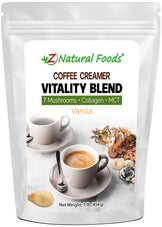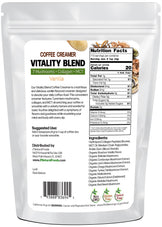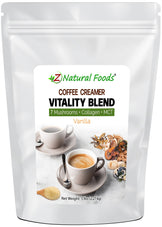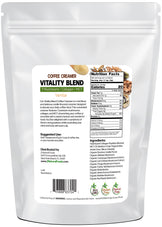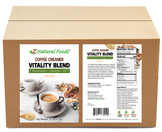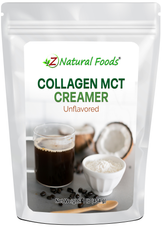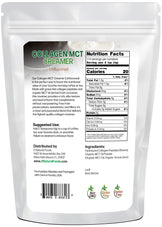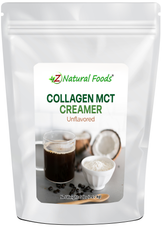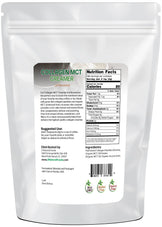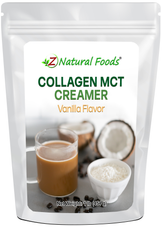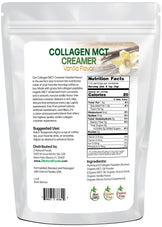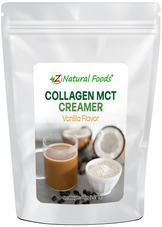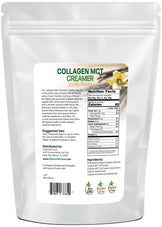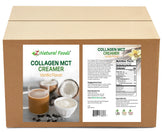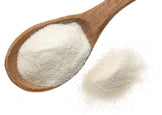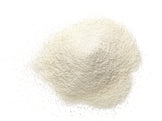Description
Description
As previously stated in our other articles, going to your local “coffee house” can be expensive and produce a high chance of consuming ingredients you know will be counterproductive for your desired optimum performance results.
The area where this is most prominent is your choice of creamers.
In an open market filled with so many tasty flavors and varieties of “creamers” we can add to our coffee, the little things we don’t notice can create potential issues for getting the most out of your daily cup of java.
So, what is the purpose of using the “right” high-quality coffee creamer?
- Begin your day with a highly nourishing tonic that provides outstanding nourishment.
- It is an easy and convenient way to consume critical ingredients to support and nourish your body.
- To provide your body with ingredients that support optimal mental and physical performance.
Before answering the question “Do healthy coffee creamers exist?” let's first look at the following:
- Defining what the term “healthy” means in relationship to food ingredients
- Examining why it is essential to know what not to put in coffee
- Examining which ingredients go into common coffee creamers
Every culture defines how and why an individual food is considered “healthy” based on various factors. According to Western medicine, healthy food is a substance that provides the nourishment needed to sustain well-being and retain energy. Traditional Chinese Medicine looks at food from a slightly different perspective. According to TCM, food is not defined as healthy or unhealthy but, instead, if it is the right food for an individual at a specific time. According to Traditional Chinese Medicine (TCM), all foods have energy. TCM teaches us that foods have Yin/ Yang energy, five temperatures, five flavors, and four directions. Ultimately, healthy foods provide a deep nourishment to fuel and sustain well-being.
While many studies suggest coffee drinkers live longer than non-coffee drinkers, some typical ingredients most people add to their cup of coffee may prevent them from obtaining the full benefits of coffee’s nourishing compounds. More research shows how adding conventional dairy to your coffee, tea, or cacao(like chocolate milk) may weaken flavinoid antioxidant capabilities. While more human studies are necessary, according to Oregon State University and the Linus Pauling Institute, preliminary studies suggest that the presence of milk protein binding to the flavinoids may be the reason for this issue.
Furthermore, the following was stated in a study examining the effects of adding milk to tea on its vascular benefits.
- Black tea significantly improved FMD in humans compared with water, whereas the addition of milk completely blunted the effects of tea.
- Of the various kinds of milk proteins, caseins accounted for these inhibiting effects of milk, probably by forming complexes with tea catechins.
Finally, the following was stated in a review discussing the Effect of the simultaneous consumption of milk and coffee on chlorogenic acids' bioavailability in humans.
- Subjects were subjected to consumption of water, instant coffee (609 mmol of CGA) (chlorogenic acids’) dissolved in water, and instant coffee dissolved in whole milk.
- Urine was collected 24 hours after each treatment was consumed to analyze CGA and metabolites by HPLC/LC-MS.
- The amount of CGA and metabolites recovered after consumption of combined coffee milk (40% ± 27%) was consistently lower in all subjects than in coffee alone (68% ± 20%).
- Concluding, the simultaneous consumption of milk and coffee may impair the bioavailability of coffee CGA in humans.
Many conventional non-dairy coffee creamer products contain unnecessary additives, preservatives, and flavoring agents, intending to create a pleasant-tasting product. The issue is that they provide no nourishment or benefit when consumed and can potentially cause harm. Some common ingredients are hydrogenated soybean oil(AKA trans fats), artificial sweeteners, corn syrup solids, and sodium casein, derived from dairy but considered acceptable because it is lactose-free. None of those ingredients provide any nourishing properties. This is why reading the ingredients is so essential. We have also learned that it is not about the small amount used daily but the accumulation of using them over a long period that creates the potential for health risks. People also look at the label and think they are low in calories but don’t pay attention to the serving size. The average person uses 3 to 4 times the serving size, which adds up over time. e
So, do healthy coffee creamers exist?
The answer is yes. However, let's examine the essential base ingredients needed to create a “healthy” coffee creamer. These base ingredients set the tone for nourishment and give your coffee a creamy, delicious texture. While cashew, oat, or almond milk is fine, MCT or coconut milk powder are optimal choices. They contain the essential fats necessary to fuel your mind and body. Remember, fats constitute the most significant nutritional energy source.
In the past, MCTs were considered unhealthy due to their high saturated fat content. However, it has been proven that medium-chain triglycerides are unlike any other fat on earth and have high nutritional value. So, why is MCT fat different? MCTs are unique fat molecules; this makes their fat different from most fats we consume. While there is no nutritional difference between a well-made MCT oil and powder, It has been suggested that MCT powder has superior qualities to the oil regarding ease of use, texture, blending, and greater ability to tolerate (due to the fibrous carrier powder, allowing for slower digestion). Most importantly, the powder allows for greater versatility and a creamier texture.
A paper discussing MCT’s ability to enhance exercise performance stated, "As a dietary supplement, MCTs are often used along with medications for treating food absorption disorders, including diarrhea, steatorrhea, and liver disease.” “MCTs have many benefits and have also been shown to reduce weight, metabolic syndrome, abdominal obesity (stomach fat), and even inflammation.”
Medium-chain triglycerides (MCT) are uniquely processed in the body, making them easier to digest and metabolize.
- Medium-chain triglycerides (MCT) are more ketogenic than long-chain triglycerides (LCT)
- Easily digested, MCTs give your body plenty of readily available energy.
There are four main types of MCTs:
- Caproic acid (C6) is an oily liquid at room temperature that may support healthy production of blood ketones. It’s found in animal fats and several plants and is slightly soluble in water with an unpleasant odor.
- Caprylic Acid (C8) has been shown to support healthy energy, boost ketone production, and facilitate weight loss.
- Capric Acid (C10) has many of the same properties as caprylic acid (C8) (e.g., it boosts ketones, is antimicrobial, and can help reduce body fat, but it generally takes a bit longer for the body to process into ketones.
- Lauric Acid (C12) is a significant component of coconut oil. Like C8 and C10, lauric acid also has antimicrobial properties. Still, because it’s a bigger molecule (more carbon atoms connected), it takes even longer to break down and isn’t optimal for ketone production.
Our MCT Oil Powder is primarily C8 and C10 with the following typical composition:
C8 (Caprylic) = 50%
C10 (Capric) = 35%
You are already ahead of the game if you use only one of these base ingredients in your coffee. Other ingredients that could be added to create a “healthy” coffee creamer are hydrolyzed collagen, 100% cacao powder, medicinal mushrooms, and tonic herbs. For more information about these ingredients, please refer to part two of our Java talk article and our Vitality Blend Coffee Creamer product description.
Non-dairy creamer products like coconut, almond, and oat milk have been highly scrutinized for potentially causing health issues from compounds naturally contained within the food. The people who believe this concept call these compounds “plant poisons” and are fundamentally missing the big picture. These theories have been debunked due to their reductionist nature and the fact that the research shows a lack of understanding of how these foods work as a whole rather than the sum of their parts. These studies are done by isolating a single compound and concentrating them to amounts most people will never consume. This is far from reality when looking at how the whole food works.
Finally, let's briefly discuss the other potential concerns: the gums and thickening agents added to your favorite plant-based nondairy coffee creamer and their connection to possible health issues.
Here are some essential points to consider before lighting your hair on fire and panicking over these ingredients.
- Many of the studies used animal models rather than human models. Therefore, more research is necessary to specifically understand the short—and long-term effects on humans.
- These thickeners are added in small amounts, and the studies show that, on average, 8 to 15 grams or more daily is where the various digestive and nutrient absorption blocking issues seem to compound.
- Therefore, to be clear, we are not saying that the potential for problems doesn’t exist; instead, it seems logical (based on the evidence) to say that we need to know more to reach an objective conclusion.
In the meantime, keep it simple and create a nourishing tonic coffee with remarkable ingredients to keep yourself optimally fueled.
In Great Health
Z Natural Foods
For more information about our Vitality Blend Coffee Creamer, go here:
For more information about our creamers, go here:



